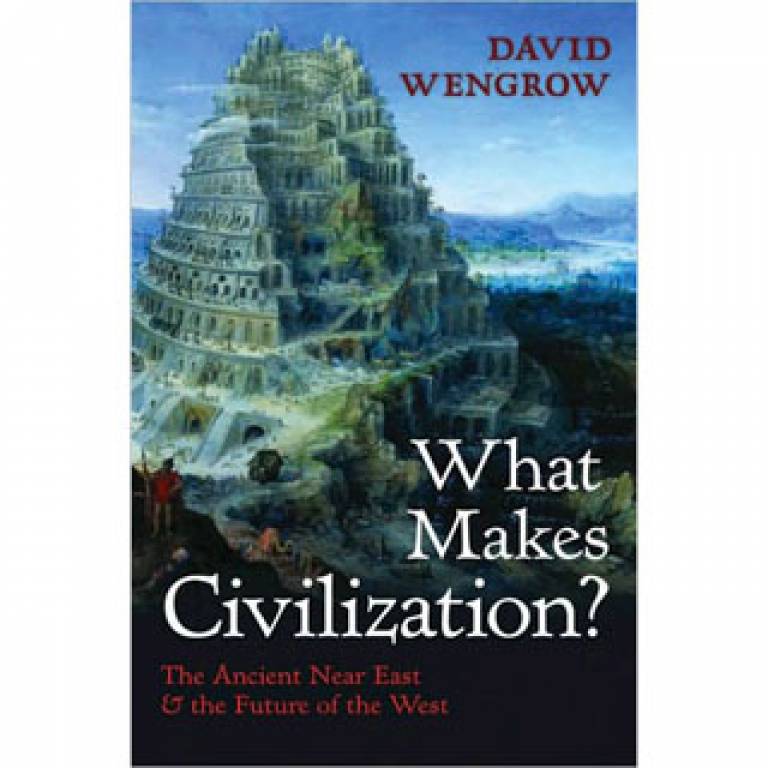What makes civilization?
16 September 2010
Links:
 ucl.ac.uk/archaeology/" target="_self">UCL Institute of Archaeology
ucl.ac.uk/archaeology/" target="_self">UCL Institute of Archaeology
In his latest book What Makes Civilization?, Dr David Wengrow (UCL Archaeology) provides a new account of the start of civilization in ancient Egypt and Mesopotamia (modern-day Iraq).
Here, he discusses how Hollywood gives us an inaccurate view of ancient civilisations and how the fundamental daily practices and desires experienced thousands of years ago in the Near East are not so different from today's.
"To talk of civilizations is not just to describe the past. It is also to reflect on what is different about the societies we live in, how they relate to one another, and the extent to which their futures are bound up with traditions inherited from previous ages. The ancient Near East occupies a uniquely paradoxical place in our understanding of civilization. We freely acknowledge that many foundations of modern civilization were laid there, along the banks of the Euphrates, the Tigris, and the Nile. Yet those same societies have come to symbolise the remote and the exotic; a world of walking mummies, possessive demons, unfathomable gods and tyrannical kings.
Most people today, I would have thought, are more likely to encounter the ancient Near East through the lens of Hollywood than through the biblical and Greco-Roman literature that informed the views of earlier generations. Still, when the Iraq Museum
in Baghdad was looted in 2003, eight decades after its foundation by
the British diplomat and archaeologist Gertrude
Bell, our newspapers proclaimed 'the death of history'. The
headlines, for once, were in my opinion proportionate to the truth.
Ancient Mesopotamia and surrounding parts of the Middle East were the setting for some of the most momentous turning points in human history (the origins of farming, the invention of the first writing system, of mechanised transport, the birth of cities and centralised government). They also, however, developed familiar ways of cooking food, consuming alcohol, branding commodities, and keeping our homes and our bodies clean. That is what archaeologists and ancient historians mean when they talk (a little coyly, these days) about 'the birth of civilization', 5,000 years ago, on the banks of the Tigris and Euphrates.
I suggest that we can no longer talk of ancient civilizations as isolated phenomena, except perhaps as a mythical charter of origin for our own nation-states. The emergence of what anthropologists call 'complex societies'-large-scale societies, of the kind that our species has known only for the last 5000 years of its existence-was bound up with the growth of new and powerful desires for things beyond the local. Our modern superpowers turn the world upside down to ensure a constant flow of things we have become culturally addicted to, oil being an obvious and relevant example. The first complex societies were no different in this regard. Metals, timber, incense, and other exotic goods were brought from far and wide to feed the gods of the Nile and the Euphrates, and to bring mortals a little closer to their home-grown visions of order and perfection: their own images of 'civilization'. The result was an astonishing flow of commodities and cultural resources which-thousands of years before the Silk Road-transformed the fate of societies and reshaped environments from the mountains of Afghanistan to the Turkish Plateau, and from the forests of Lebanon to the deserts of Arabia."
What Makes Civilization?: The Ancient Near East & the Future of the West is published by Oxford University Press, August 2010
UCL context
The UCL Institute of Archaeology is the largest and one of the most highly
regarded centres for archaeology, cultural heritage and museum studies in
Britain. It is one of the very few places in the world actively pursuing
research on a truly global scale in the archaeological sciences, heritage
studies and world archaeology.
Its degree programmes offer an unrivalled variety of course options covering a diverse array of archaeological topics, and wide-ranging fieldwork opportunities. The institute hosts numerous events on many different aspects of archaeology and is linked to many other heritage institutions, archaeological societies and organizations, providing an outstanding research environment for staff, students and visitors.
Related links
Uncovering Caerleon's Roman past
 Close
Close

